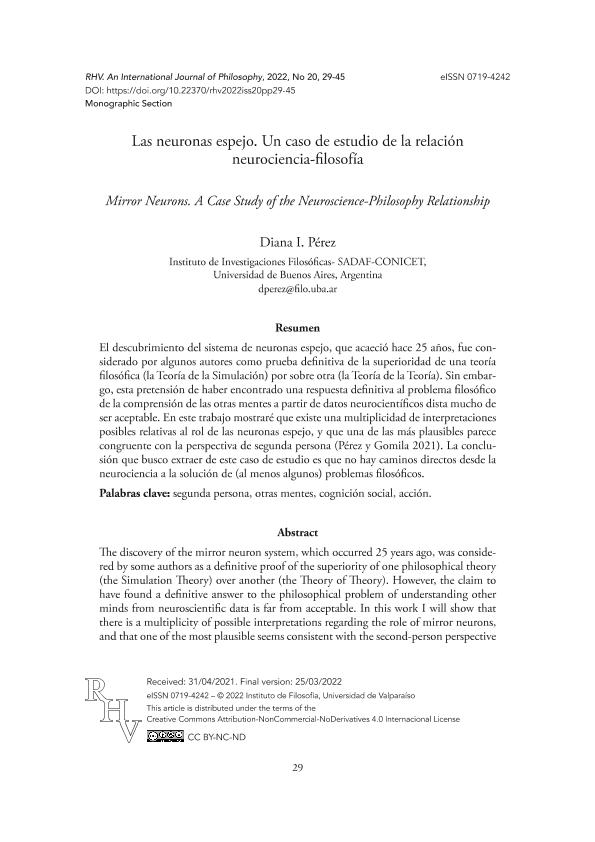Mostrar el registro sencillo del ítem
dc.contributor.author
Perez, Diana Ines

dc.date.available
2023-07-12T10:05:58Z
dc.date.issued
2022-12-01
dc.identifier.citation
Perez, Diana Ines; Las neuronas espejo: Un caso de estudio de la relación neurociencia-filosofía; Universidad de Valparaíso. Facultad de Humanidades. Instituto de Filosofía ; An International Journal of Philosophy; 20; 1-12-2022; 29-45
dc.identifier.issn
0719-4234
dc.identifier.uri
http://hdl.handle.net/11336/203365
dc.description.abstract
El descubrimiento del sistema de neuronas espejo, que acaeció hace 25 años, fue considerado por algunos autores como prueba definitiva de la superioridad de una teoría filosófica (la Teoría de la Simulación) por sobre otra (la Teoría de la Teoría). Sin emba go, esta pretensión de haber encontrado una respuesta definitiva al problema filosófico de la comprensión de las otras mentes a partir de datos neurocientíficos dista mucho de ser aceptable. En este trabajo mostraré que existe una multiplicidad de interpretaciones posibles relativas al rol de las neuronas espejo, y que una de las más plausibles parece congruente con la perspectiva de segunda persona (Pérez y Gomila 2021). La conclusión que busco extraer de este caso de estudio es que no hay caminos directos desde la neurociencia a la solución de (al menos algunos) problemas filosóficos.
dc.description.abstract
The discovery of the mirror neuron system, which occurred 25 years ago, was considered by some authors as a definitive proof of the superiority of one philosophical theory (the Simulation Theory) over another (the Theory of Theory). However, the claim to have found a definitive answer to the philosophical problem of understanding other minds from neuroscientific data is far from acceptable. In this work I will show that there is a multiplicity of possible interpretations regarding the role of mirror neurons, and that one of the most plausible seems consistent with the second-person perspective (Pérez and Gomila 2021). The conclusion I seek to draw from this case study is that there are no direct paths from neuroscience to the solution of (at least some) philosophical problems.
dc.format
application/pdf
dc.language.iso
spa
dc.publisher
Universidad de Valparaíso. Facultad de Humanidades. Instituto de Filosofía
dc.rights
info:eu-repo/semantics/openAccess
dc.rights.uri
https://creativecommons.org/licenses/by-nc-nd/2.5/ar/
dc.subject
SEGUNDA PERSONA
dc.subject
OTRAS MENTES
dc.subject
COGNICIÓN SOCIAL
dc.subject
ACCIÓN
dc.subject.classification
Filosofía, Historia y Filosofía de la Ciencia y la Tecnología

dc.subject.classification
Filosofía, Ética y Religión

dc.subject.classification
HUMANIDADES

dc.title
Las neuronas espejo: Un caso de estudio de la relación neurociencia-filosofía
dc.title
Mirror Neurons: A Case Study of the Neuroscience-Philosophy Relationship
dc.type
info:eu-repo/semantics/article
dc.type
info:ar-repo/semantics/artículo
dc.type
info:eu-repo/semantics/publishedVersion
dc.date.updated
2023-06-21T15:32:34Z
dc.identifier.eissn
0719-4242
dc.journal.number
20
dc.journal.pagination
29-45
dc.journal.pais
Chile

dc.journal.ciudad
Valparaíso
dc.description.fil
Fil: Perez, Diana Ines. Consejo Nacional de Investigaciones Científicas y Técnicas. Oficina de Coordinación Administrativa Parque Centenario. Instituto de Investigaciones Filosóficas. - Sociedad Argentina de Análisis Filosófico. Instituto de Investigaciones Filosóficas; Argentina
dc.journal.title
An International Journal of Philosophy
dc.relation.alternativeid
info:eu-repo/semantics/altIdentifier/url/https://revistas.uv.cl/index.php/RHV/article/view/3223
dc.relation.alternativeid
info:eu-repo/semantics/altIdentifier/doi/http://dx.doi.org/10.22370/rhv2022iss20pp29-45
Archivos asociados
